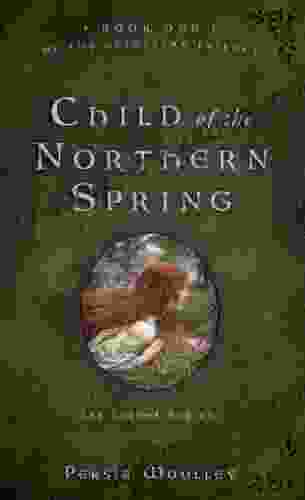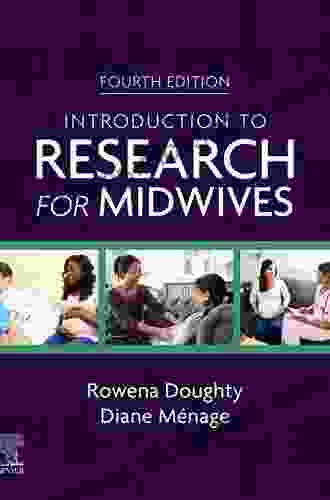An Introduction to Research for Midwives: A Comprehensive Overview

Research plays a vital role in the advancement of midwifery practice, providing evidence-based knowledge to inform decision-making, improve outcomes, and enhance the quality of care for mothers and babies. This comprehensive guide introduces midwives to the fundamental principles of research, equipping them with the skills and understanding to effectively engage in research activities.
4.7 out of 5
| Language | : | English |
| File size | : | 956 KB |
| Text-to-Speech | : | Enabled |
| Screen Reader | : | Supported |
| Enhanced typesetting | : | Enabled |
| Print length | : | 260 pages |
Identifying Research Questions
The foundation of research lies in identifying meaningful research questions that address gaps in knowledge or challenges in midwifery practice. Midwives can derive research questions from clinical observations, literature reviews, or discussions with colleagues and consumers. Clearly defining the research question ensures that the subsequent research process is focused and specific.
Research Design
The next step involves selecting an appropriate research design that aligns with the research question and objectives. Common research designs for midwives include:
- Quantitative research: Uses numerical data to measure and analyze variables, often through surveys, experiments, or observational studies.
- Qualitative research: Explores complex phenomena through in-depth interviews, focus groups, or observations, providing insights into experiences, perceptions, and meanings.
- Mixed methods research: Combines quantitative and qualitative approaches to gain a more comprehensive understanding of a research topic.
Data Collection Methods
Data collection involves gathering information to answer the research question. Midwives can utilize various data collection methods, including:
- Surveys: Collect quantitative data from a large sample of participants through questionnaires.
- Interviews: Engage in one-on-one conversations to gather qualitative data from individuals.
- Focus groups: Facilitate group discussions to explore shared experiences and perspectives.
- Observations: Observe and record behaviors or phenomena in real-world settings.
- Document analysis: Examine existing documents, such as medical records or policy statements, to gather data.
Data Analysis
Once data is collected, it undergoes analysis to extract meaningful patterns and insights. Quantitative data is typically analyzed using statistical methods, while qualitative data is analyzed through thematic analysis or other qualitative techniques.
Ethical Considerations
Midwives have an ethical responsibility to conduct research with integrity and respect for the participants' rights. Ethical considerations include:
- Informed consent: Obtaining voluntary and informed consent from participants before involving them in research.
- Confidentiality: Maintaining the privacy of participants and ensuring the confidentiality of their data.
- Protection from harm: Minimizing risks and ensuring the well-being of participants throughout the research process.
Research Utilization
The ultimate goal of research is to translate findings into practice and improve midwifery care. Midwives can utilize research findings to:
- Inform clinical decision-making: Use evidence-based knowledge to make informed decisions about patient care.
- Develop and evaluate interventions: Design and implement effective interventions based on research findings.
- Advocate for policy changes: Use research evidence to support advocacy efforts for improved midwifery services and policies.
- Educate mothers and families: Share research findings with mothers and families to empower them in making informed choices about their care.
Engaging in research empowers midwives to contribute to the advancement of midwifery practice and improve the quality of care for mothers and babies. This comprehensive guide provides a solid foundation for midwives seeking to develop their research skills and utilize research findings effectively. By embracing research, midwives can become change agents in shaping the future of midwifery and ensuring optimal outcomes for all.
4.7 out of 5
| Language | : | English |
| File size | : | 956 KB |
| Text-to-Speech | : | Enabled |
| Screen Reader | : | Supported |
| Enhanced typesetting | : | Enabled |
| Print length | : | 260 pages |
Do you want to contribute by writing guest posts on this blog?
Please contact us and send us a resume of previous articles that you have written.
 Fiction
Fiction Non Fiction
Non Fiction Romance
Romance Mystery
Mystery Thriller
Thriller SciFi
SciFi Fantasy
Fantasy Horror
Horror Biography
Biography Selfhelp
Selfhelp Business
Business History
History Classics
Classics Poetry
Poetry Childrens
Childrens Young Adult
Young Adult Educational
Educational Cooking
Cooking Travel
Travel Lifestyle
Lifestyle Spirituality
Spirituality Health
Health Fitness
Fitness Technology
Technology Science
Science Arts
Arts Crafts
Crafts DIY
DIY Gardening
Gardening Petcare
Petcare Jeff Driscoll
Jeff Driscoll Imogen Barnacle
Imogen Barnacle One Exam Prep
One Exam Prep Jeff Deters
Jeff Deters Brian Hayden
Brian Hayden Deena Kastor
Deena Kastor James Campbell
James Campbell Stanley Vestal
Stanley Vestal Rob Kelley
Rob Kelley Kevin Robbins
Kevin Robbins Govert Schilling
Govert Schilling Sandra Steingraber
Sandra Steingraber Graham Allcott
Graham Allcott Richard Weaver
Richard Weaver Daniel Paolicchi
Daniel Paolicchi Flor M Salvador
Flor M Salvador Danielle Centoni
Danielle Centoni Sadie Word
Sadie Word Anjeanette Carter
Anjeanette Carter Jessica Hall
Jessica Hall Julius Evola
Julius Evola Karen Jettmar
Karen Jettmar Jade Mckenzie Stone
Jade Mckenzie Stone Grant Mcomie
Grant Mcomie Brian Burke
Brian Burke Shonda Schilling
Shonda Schilling Michael Harner
Michael Harner Don Larsen
Don Larsen Illustrated Edition Kindle Edition
Illustrated Edition Kindle Edition Julie Gianelloni Connor
Julie Gianelloni Connor Joe Shuber
Joe Shuber Tracy Salcedo
Tracy Salcedo Steph Davis
Steph Davis John Feinstein
John Feinstein F C Yee
F C Yee David Roche
David Roche Elissa Altman
Elissa Altman Clinton Bailey
Clinton Bailey John Heart
John Heart Steven Dillon
Steven Dillon Cynthia Miller Idriss
Cynthia Miller Idriss Oswald Rivera
Oswald Rivera Comni S Art Publishing
Comni S Art Publishing Karl Deisseroth
Karl Deisseroth Edward B Fiske
Edward B Fiske Peter Liljedahl
Peter Liljedahl Marc Weissbluth M D
Marc Weissbluth M D Mia Collins Parker
Mia Collins Parker Michael Deshotels
Michael Deshotels Michelle Hercules
Michelle Hercules Felicity Aston
Felicity Aston Sharlene Healy
Sharlene Healy Julie Watson
Julie Watson Henny Bogan
Henny Bogan Ann Bausum
Ann Bausum David Robert Grimes
David Robert Grimes Ryan Boudreaux
Ryan Boudreaux Ron Rhodes
Ron Rhodes Fred Heath
Fred Heath Joshua Glenn
Joshua Glenn Miyamoto Musashi
Miyamoto Musashi Bruce Gregor Hodge
Bruce Gregor Hodge Peter Julius Sloan
Peter Julius Sloan Donovan Buck
Donovan Buck Eugene Hecht
Eugene Hecht Lin Lougheed
Lin Lougheed Ben Magid
Ben Magid Michael S A Graziano
Michael S A Graziano Chuck Robbins
Chuck Robbins Alex Bonham
Alex Bonham Wendy Lyons Sunshine
Wendy Lyons Sunshine Helen Yang
Helen Yang Ann Chamberlin
Ann Chamberlin Deborah Reber
Deborah Reber Larry Greene
Larry Greene Rosanne S Mchenry
Rosanne S Mchenry Richard Paul Evans
Richard Paul Evans Evelyn Monahan
Evelyn Monahan Max M Houck
Max M Houck Emile Durkheim
Emile Durkheim Robert H Shumway
Robert H Shumway Sean Parker Dennison
Sean Parker Dennison Susan Zimmermann
Susan Zimmermann James A Fain
James A Fain Lindsey Fitzharris
Lindsey Fitzharris Poul Anderson
Poul Anderson Johnny Molloy
Johnny Molloy Tom Mole
Tom Mole Ann Douglas
Ann Douglas Sharan B Merriam
Sharan B Merriam Terry Tempest Williams
Terry Tempest Williams Bob Stegner
Bob Stegner Jazmine Mccoy
Jazmine Mccoy Karen Lynch
Karen Lynch Damo Mitchell
Damo Mitchell Dr Gareth Moore
Dr Gareth Moore Weston Ochse
Weston Ochse Larry Mueller
Larry Mueller Ann Marie Brown
Ann Marie Brown William Lee
William Lee Ann Cameron
Ann Cameron Samuel G Puryear
Samuel G Puryear Henry A Giroux
Henry A Giroux Wade Bourne
Wade Bourne Frank Mastini
Frank Mastini Richard J Davidson
Richard J Davidson Shalane Flanagan
Shalane Flanagan Johnegreek
Johnegreek Eric Alpenfels
Eric Alpenfels Shel Banks
Shel Banks Ava Richardson
Ava Richardson Kenneth Wilgus Phd
Kenneth Wilgus Phd Sherman Dickinson
Sherman Dickinson Nicholaos Kehagias
Nicholaos Kehagias Doug Cook
Doug Cook Anja Beran
Anja Beran Joshua Straub
Joshua Straub Ann Israel
Ann Israel Sue C Funnell
Sue C Funnell Mark Wilson
Mark Wilson Mike Lowery
Mike Lowery Kate Bowler
Kate Bowler Erin Davis
Erin Davis Tabatha Chansard Phd
Tabatha Chansard Phd Behrouz Moemeni
Behrouz Moemeni Brian Smith
Brian Smith Michael Kranish
Michael Kranish Jena Pincott
Jena Pincott Jimmy Song
Jimmy Song Jack O Connor
Jack O Connor Colin Rees
Colin Rees Shirley Maclaine
Shirley Maclaine Iri Cermak
Iri Cermak William H Parker
William H Parker Ray Bergman
Ray Bergman Becky Choi
Becky Choi Simon Boulter
Simon Boulter Marley Hall
Marley Hall Richard Rorty
Richard Rorty Antonia Malchik
Antonia Malchik Nicholas Wade
Nicholas Wade Gavin Atkin
Gavin Atkin Nims Purja
Nims Purja Tina Payne Bryson
Tina Payne Bryson Tony Butt
Tony Butt Judy Goodspeed
Judy Goodspeed Chris Matakas
Chris Matakas Tanya Holland
Tanya Holland Magnus D Jango
Magnus D Jango Helen Czerski
Helen Czerski Melissa Watson
Melissa Watson Paul Stewart
Paul Stewart J W Lynne
J W Lynne Sherri Mitchell
Sherri Mitchell Natale Barca
Natale Barca David Poyer
David Poyer Angelo Tropea
Angelo Tropea Yuri Kitayama
Yuri Kitayama Bryson Payne
Bryson Payne Tim Leffel
Tim Leffel Lindsey Hutchinson
Lindsey Hutchinson Jean Molesky Poz
Jean Molesky Poz Imre Lakatos
Imre Lakatos Robin Barrett
Robin Barrett Jennifer Dugan
Jennifer Dugan Sankofa Ra
Sankofa Ra Laurie R King
Laurie R King Jeremy Griffith
Jeremy Griffith Roasted Rat
Roasted Rat Oliver Horovitz
Oliver Horovitz David Deming
David Deming Hugh Harris
Hugh Harris Rc Blakes Jr
Rc Blakes Jr Quinn Loftis
Quinn Loftis David E Maranz
David E Maranz Ray Walker
Ray Walker Stewart Pearce
Stewart Pearce Jack El Hai
Jack El Hai John Monyjok Maluth
John Monyjok Maluth Don Jose Ruiz
Don Jose Ruiz Chris Townsend
Chris Townsend Gordon Forbes
Gordon Forbes Brook Waters
Brook Waters Marke Bieschke
Marke Bieschke Bruce Feiler
Bruce Feiler Dr Richard L Travis
Dr Richard L Travis Joshua Slocum
Joshua Slocum Emma Anne Bellamy
Emma Anne Bellamy Kamran Nazeer
Kamran Nazeer Tennille Chaffin
Tennille Chaffin Ariel Dalfen
Ariel Dalfen Janet Renner
Janet Renner Angie Papple Johnston
Angie Papple Johnston Terry Hill
Terry Hill Tim Kimmel
Tim Kimmel Myron Mixon
Myron Mixon Frank Falcinelli
Frank Falcinelli Jan Witkowski
Jan Witkowski Ann Cook
Ann Cook John Brockman
John Brockman Tommy Shea
Tommy Shea Dale Grdnic
Dale Grdnic Susie Albert Miller
Susie Albert Miller Ronald M Holmes
Ronald M Holmes 2nd Edition Kindle Edition
2nd Edition Kindle Edition Josh Kaufman
Josh Kaufman Steven Cowie
Steven Cowie David Rakel
David Rakel Ichigo Takano
Ichigo Takano Angie Thomas
Angie Thomas Iain Mccalman
Iain Mccalman Scott Cunningham
Scott Cunningham Elisa S Amore
Elisa S Amore Ray Dozier
Ray Dozier Vera Snow
Vera Snow Tyler Ninja Blevins
Tyler Ninja Blevins Angie Stanton
Angie Stanton Enrique Desmond Arias
Enrique Desmond Arias Laurie Varga
Laurie Varga Steve Economides
Steve Economides Clayton Geoffreys
Clayton Geoffreys Bill Bishop
Bill Bishop Brendan Leonard
Brendan Leonard William S Frisbee Jr
William S Frisbee Jr Phoenix Nature
Phoenix Nature Ann Bingham
Ann Bingham Katherine Keith
Katherine Keith Jada Fisher
Jada Fisher Nick Clausen
Nick Clausen Will Murray
Will Murray L R Shorter
L R Shorter Gail Carriger
Gail Carriger Lisa Hoehn
Lisa Hoehn Elliott Mendelson
Elliott Mendelson Julie Knutson
Julie Knutson Discover Press
Discover Press Robert A Sadowski
Robert A Sadowski Rebecca Rolland
Rebecca Rolland Frederick Lewis Allen
Frederick Lewis Allen Frances Gies
Frances Gies John Novosel
John Novosel Jody Vasquez
Jody Vasquez Tabatha Yeatts
Tabatha Yeatts Stu Ingraham
Stu Ingraham Elizabeth G Harper
Elizabeth G Harper Barry Correia
Barry Correia Bookrags Com
Bookrags Com Richard Karban
Richard Karban Jim Burris
Jim Burris Jessica Redland
Jessica Redland Peter Feinman
Peter Feinman Patricia Ann Lynch
Patricia Ann Lynch Russ Mitchell
Russ Mitchell Norman Hall
Norman Hall Joe Fox
Joe Fox Tom Dokken
Tom Dokken Tracy Wolff
Tracy Wolff Intisar Khanani
Intisar Khanani Beth A Grosshans
Beth A Grosshans John Krige
John Krige Mark Chang
Mark Chang Shannon Greenland
Shannon Greenland Ed Robinson
Ed Robinson Dick Crouser
Dick Crouser Cathy Glass
Cathy Glass Stephen G Post
Stephen G Post Darren Kirby
Darren Kirby Michael Easter
Michael Easter Little Mat
Little Mat Eliot Cowan
Eliot Cowan Ann Mariah Cook
Ann Mariah Cook Mark Bertin Md
Mark Bertin Md Len Kravitz
Len Kravitz Al Goldis
Al Goldis Megan Hallett
Megan Hallett Kevin Callan
Kevin Callan Christina Mcghee
Christina Mcghee Vicki Lansky
Vicki Lansky Vivienne Crow
Vivienne Crow Jason Rosenhouse
Jason Rosenhouse Sharon N Covington
Sharon N Covington Cgp Books
Cgp Books Joanna Nylund
Joanna Nylund Daniel Harman
Daniel Harman Jennifer Harvey
Jennifer Harvey Scott Keyes
Scott Keyes Paul Eng
Paul Eng David J Wallin
David J Wallin James Nickells
James Nickells Mary Helen Bowers
Mary Helen Bowers Dean Karnazes
Dean Karnazes Paul Hough
Paul Hough Jennie Germann Molz
Jennie Germann Molz Emma Hansen
Emma Hansen Caleb Lee
Caleb Lee Paul Fowler
Paul Fowler Christina Tosch
Christina Tosch Lisa Gardner
Lisa Gardner Anita Knight Kuhnley
Anita Knight Kuhnley Edward O Thorp
Edward O Thorp Ann Leary
Ann Leary Frank X Sutman
Frank X Sutman Sarah J Tracy
Sarah J Tracy Jane Goodall
Jane Goodall Martin L Kutscher
Martin L Kutscher Beth Cavenaugh
Beth Cavenaugh Wendy Moore
Wendy Moore Michele Caputo
Michele Caputo Tim Guest
Tim Guest Scott Haugen
Scott Haugen Art Clepper
Art Clepper Shannon Philpott Sanders
Shannon Philpott Sanders Emiko Jean
Emiko Jean Baby Professor
Baby Professor Michael Yessis
Michael Yessis Presh Talwalkar
Presh Talwalkar Hippocrates
Hippocrates Sarah Albee
Sarah Albee Thomas Lewis
Thomas Lewis Thomas Thompson
Thomas Thompson Carla Hall
Carla Hall Dale Peterson
Dale Peterson Sean Vigue
Sean Vigue Sara Dykman
Sara Dykman Gary Robert Muschla
Gary Robert Muschla Darlene D Pedersen
Darlene D Pedersen Robert Jervis
Robert Jervis Chris Dombrowski
Chris Dombrowski George Hincapie
George Hincapie Lara Maiklem
Lara Maiklem Victoria Clarke
Victoria Clarke Elena Delle Donne
Elena Delle Donne Dr Tracy Sanders
Dr Tracy Sanders Chad Wesley Smith
Chad Wesley Smith Sara Wolf
Sara Wolf Deborah J Bennett
Deborah J Bennett Jeff A Johnson
Jeff A Johnson Peter Galison
Peter Galison Anthony Castrovince
Anthony Castrovince Cindy Hudson
Cindy Hudson Kalman Samuels
Kalman Samuels Sadie Lake
Sadie Lake Scott Douglas
Scott Douglas Michael Harris
Michael Harris Neil Smith
Neil Smith Anil Ananthaswamy
Anil Ananthaswamy Jenny Carr
Jenny Carr Duncan Van Dusen
Duncan Van Dusen Ania G
Ania G Mary O Hora
Mary O Hora Robison Wells
Robison Wells Kathy Fray
Kathy Fray Rae Brewer
Rae Brewer Deborah Hunter Kells
Deborah Hunter Kells Peter Lee
Peter Lee Dick Pobst
Dick Pobst Benjamin T Mast
Benjamin T Mast Scholastic
Scholastic Bill Fowler
Bill Fowler Marc Roche
Marc Roche Judith A Muschla
Judith A Muschla Hunter S Fulghum
Hunter S Fulghum J M Gregson
J M Gregson Bob Greene
Bob Greene Gina Atencio Maclean Psyd
Gina Atencio Maclean Psyd Paul Vachon
Paul Vachon Jason Aaron
Jason Aaron Aditya Chatterjee
Aditya Chatterjee Rico Austin
Rico Austin Waysun Liao
Waysun Liao Buster Holmes
Buster Holmes Dickie Bird
Dickie Bird Julie Cwikla Phd
Julie Cwikla Phd Stan Lee
Stan Lee Rick Clark
Rick Clark Stephane Cazeault
Stephane Cazeault Martina Sprague
Martina Sprague Guy Deutscher
Guy Deutscher John J Kaag
John J Kaag Brent E Turvey
Brent E Turvey Eric Hanauer
Eric Hanauer Warren Berger
Warren Berger Miles Cameron
Miles Cameron Rebecca M Warner
Rebecca M Warner Terry Leiden
Terry Leiden Reed Mangels
Reed Mangels Sandra Cisneros
Sandra Cisneros Sarah Pink
Sarah Pink T Chris Riley Tillman
T Chris Riley Tillman Laura M Ahearn
Laura M Ahearn J Budziszewski
J Budziszewski Jean Rose
Jean Rose Lori Morrison
Lori Morrison Dan Hicks
Dan Hicks Carl J Pratt
Carl J Pratt David J Lieberman
David J Lieberman Eric B Taylor
Eric B Taylor William J Ray
William J Ray Nancy Ellen Abrams
Nancy Ellen Abrams Molly Harper
Molly Harper Kaylind Olson
Kaylind Olson Laurence Gonzales
Laurence Gonzales Brian Platzer
Brian Platzer Elwyn Hayes
Elwyn Hayes Brianna Madia
Brianna Madia D J Taylor
D J Taylor Mark Mayfield
Mark Mayfield Kristen S Kurland
Kristen S Kurland Tahereh Mafi
Tahereh Mafi Douglas Axe
Douglas Axe Jerry C Whitaker
Jerry C Whitaker Nouaoui Khedidja
Nouaoui Khedidja Anita Cortez
Anita Cortez Benedict Go
Benedict Go Je Earl
Je Earl Emily R King
Emily R King Dorothy Roberts
Dorothy Roberts Susanne Elizabeth Freidberg
Susanne Elizabeth Freidberg Steph Jagger
Steph Jagger J L Heilbron
J L Heilbron Gary Sutherland
Gary Sutherland Sean Deveney
Sean Deveney Kathy Borkoski
Kathy Borkoski Tyler Feder
Tyler Feder Phil G Tang
Phil G Tang Jim Grimsley
Jim Grimsley Pete Earley
Pete Earley Shane Frederick
Shane Frederick R H Charles
R H Charles Robin Esrock
Robin Esrock Robert G Bugge
Robert G Bugge Erling Kagge
Erling Kagge Ann Imig
Ann Imig Paul Twitchell
Paul Twitchell Mayur Movalia
Mayur Movalia J M Thompson
J M Thompson Nick Schade
Nick Schade Charlene Beswick
Charlene Beswick Jon G Hughes
Jon G Hughes Alana Ash
Alana Ash M K Hume
M K Hume Peter Wacht
Peter Wacht John Romer
John Romer Dominique Pearson
Dominique Pearson Ryan Tandler
Ryan Tandler Daxton Wilde
Daxton Wilde Paul Volponi
Paul Volponi Gregory J Stewart
Gregory J Stewart Mari Silva
Mari Silva Simon Winchester
Simon Winchester Tri Thong Dang
Tri Thong Dang David M Gitlitz
David M Gitlitz Namit Arora
Namit Arora Rachel Hartman
Rachel Hartman Wendy Mogel
Wendy Mogel Sara Zaske
Sara Zaske Willie Mosconi
Willie Mosconi Kit Deslauriers
Kit Deslauriers Kim Loraine
Kim Loraine Joshua Wright
Joshua Wright Jean Paul Pequegnot
Jean Paul Pequegnot Eric Wargo
Eric Wargo Michael Edelson
Michael Edelson Stephanie Garber
Stephanie Garber Katherine Nichols
Katherine Nichols John Frohnmayer
John Frohnmayer Justin Mcelroy
Justin Mcelroy J M Adovasio
J M Adovasio Remmi Smith
Remmi Smith Julian Guthrie
Julian Guthrie Felice Benuzzi
Felice Benuzzi Isla Gordon
Isla Gordon Nikki Goth Itoi
Nikki Goth Itoi Sherrie Eldridge
Sherrie Eldridge Tami Oldham Ashcraft
Tami Oldham Ashcraft Robert Edelman
Robert Edelman Max Kuhn
Max Kuhn Joan Didion
Joan Didion James Freeman
James Freeman Marissa Zwetow Lmft
Marissa Zwetow Lmft Douglas Turkington
Douglas Turkington Elizabeth Wayland Barber
Elizabeth Wayland Barber Lisa Charlebois
Lisa Charlebois L A Cotton
L A Cotton Persia Woolley
Persia Woolley Emily Teeter
Emily Teeter Judy Cannato
Judy Cannato Marck Vaisman
Marck Vaisman Philip P Massaro
Philip P Massaro Janet Patkowa
Janet Patkowa Rachel Levin
Rachel Levin Bruce Ackerberg
Bruce Ackerberg Kumiko Makihara
Kumiko Makihara Anita Biase
Anita Biase Christof Koch
Christof Koch Sharon Cameron
Sharon Cameron Dr Mike Dilkes
Dr Mike Dilkes Kristin Knight Pace
Kristin Knight Pace Jenna Tinsley
Jenna Tinsley Joy Bauer
Joy Bauer Val Waldeck
Val Waldeck Peter Croker
Peter Croker Beth Berry
Beth Berry
Light bulbAdvertise smarter! Our strategic ad space ensures maximum exposure. Reserve your spot today!

 Graham BlairSir Gawain and the Green Knight: A Journey Through Chivalry, Magic, and the...
Graham BlairSir Gawain and the Green Knight: A Journey Through Chivalry, Magic, and the... Enrique BlairFollow ·3.2k
Enrique BlairFollow ·3.2k Miguel de CervantesFollow ·16.4k
Miguel de CervantesFollow ·16.4k James GrayFollow ·11.8k
James GrayFollow ·11.8k Evan HayesFollow ·4.7k
Evan HayesFollow ·4.7k Cristian CoxFollow ·3.4k
Cristian CoxFollow ·3.4k Eli BlairFollow ·4.3k
Eli BlairFollow ·4.3k Dennis HayesFollow ·16.7k
Dennis HayesFollow ·16.7k Walter SimmonsFollow ·17.2k
Walter SimmonsFollow ·17.2k

 Ernest J. Gaines
Ernest J. GainesMy Golf Blog Revolution: Open Stance
Are you ready to revolutionize your golf...

 Gene Powell
Gene PowellThe Unparalleled Genius of Calculus Volume Ichigo Takano:...
: The Birth of a...

 Edgar Hayes
Edgar HayesChild of the Northern Spring: A Journey of Discovery and...
In the heart of...

 Anthony Wells
Anthony WellsHybrid Aria: A Harmonious Blend of Modern Comfort and...
In the heart of a bustling...
4.7 out of 5
| Language | : | English |
| File size | : | 956 KB |
| Text-to-Speech | : | Enabled |
| Screen Reader | : | Supported |
| Enhanced typesetting | : | Enabled |
| Print length | : | 260 pages |














